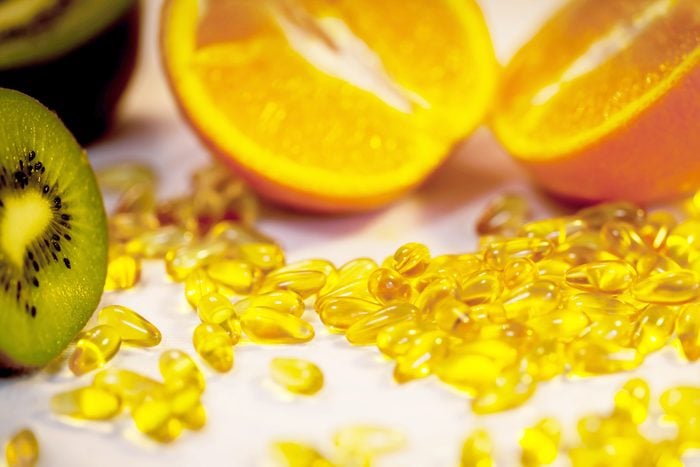
You’re not feeling 100%. Maybe you have a symptom of the latest COVID variant, you’ve taken a COVID test (here’s how to tell if it works even if it’s expired), or even tried out our COVID vs. flu quiz. You’re confident you have COVID—so now, what’s the best way to fight it and feel better?
Certain vitamins can play a role in immune health, and some of them—like vitamin C, zinc and vitamin D, according to the National Institutes of Health—are also being studied for the treatment and prevention of COVID-19. Keep reading for what research is showing are the best vitamins to take for COVID-19, and speak with your licensed healthcare provider before you introduce any of these to your routine.
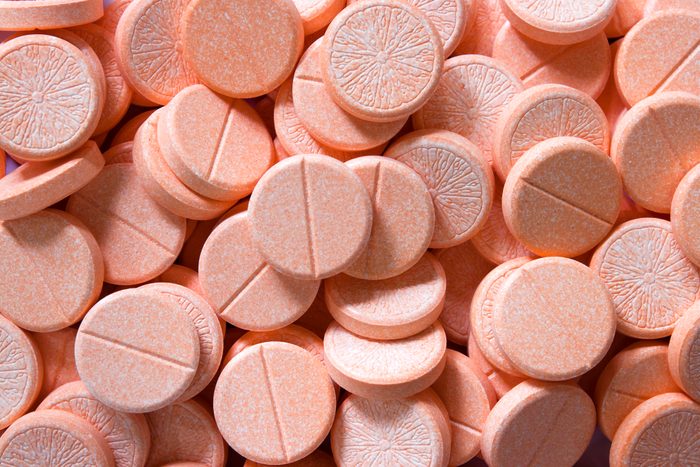
The best vitamins to take for COVID
1. Vitamin C
Though the National Institutes of Health (NIH) says there’s not enough evidence to recommend either for or against using vitamin C for COVID-19, some research does indicate there are benefits to taking vitamin C.
High-dose vitamin C has been shown to reduce inflammation, improve oxygen support status and reduce death in people with COVID-19, according to a 2022 study published in AIMS Microbiology. Other scientists say there’s still not enough evidence to say with certainty whether it can treat or prevent the disease.
Sharon Palmer, RDN, a nutritionist from Ojai, CA, tells The Healthy @Reader’s Digest that getting enough vitamin C (along with B vitamins, magnesium and zinc) can reduce oxidative stress, which can help reduce cell and tissue damage.
“Getting plenty of antioxidants in the form of fruits and vegetables, which are filled with phytochemicals that have antioxidant agents in them, is a good idea,” Palmer adds.
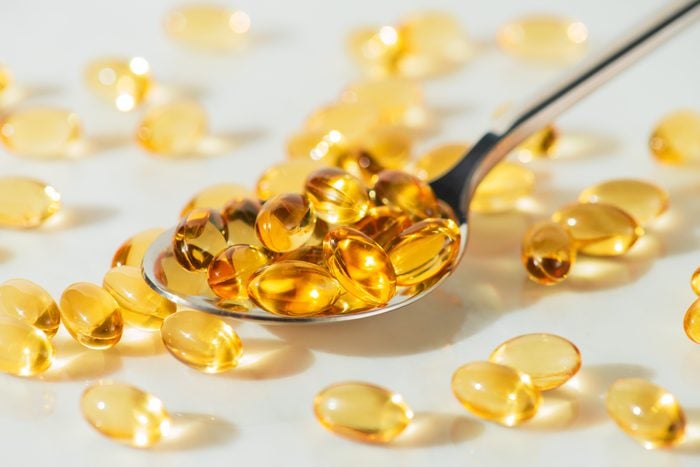
2. Vitamin D
Vitamin D reached all-time popularity during the pandemic. If there’s one vitamin that’s been researched the most with regard to COVID-19, it may be this one. Science seems to show there are some links between vitamin D and COVID.
A 2023 systemic review of 13 randomized controlled trials published in Nutrients found that high doses of vitamin D have potential benefits in reducing the length of a hospital stay for COVID-19, as well as intensive care unit (ICU) admission rates. There was not a significant statistical difference on the overall effect on mortality, Ali Bandier, MS, RD, CDN a registered dietitian from New York, tells The Healthy.
There are mixed results on the impact vitamin D supplementation can have on someone who has COVID-19, Bandier adds. One 2023 review of several studies published in Frontiers in Nutrition shows it doesn’t reduce ICU admission, ventilation, intubation or death. But another 2023 study published in Epidemiology and Health found that not having enough vitamin D could lead to more severe disease. Those researchers recommended making sure levels were optimal as a preventative measure.
The NIH says there’s not enough evidence to recommend either for or against using vitamin D for COVID-19. Note that it’s also possible to overdose on vitamin D—just another key reason to speak with your licensed healthcare provider.
Research: Doing This After Your Flu or COVID Vaccine Maximizes Your Immunity
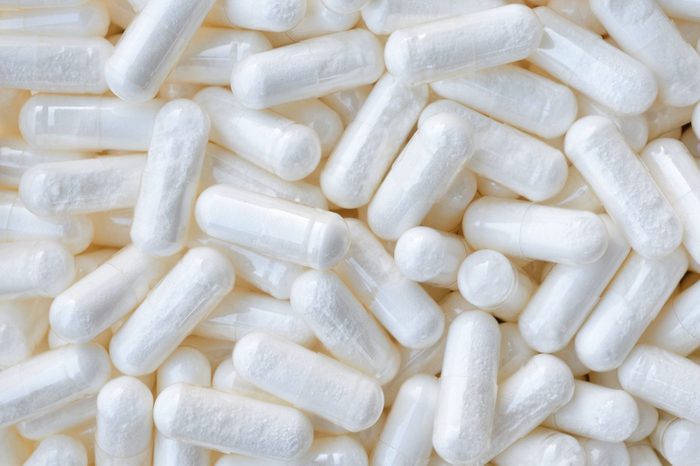
3. Zinc
There is quite a bit of research indicating that the mineral zinc can be helpful at helping you fend off COVID-19.
A small 2023 study found that taking zinc reduced death, hospital admission and shortened duration of symptoms. Other 2023 research saw improvements with regard to death, but not symptoms.
The NIH panel says there’s not enough evidence to recommend that you take zinc for COVID-19 or that you don’t. They warn not to use too much zinc if you do take it. Get up to 11 milligrams (mg) daily if you’re a man or eight milligrams if you’re a woman who isn’t pregnant.
13 Foods That Are High in Zinc to Help You Fight Your Next Virus
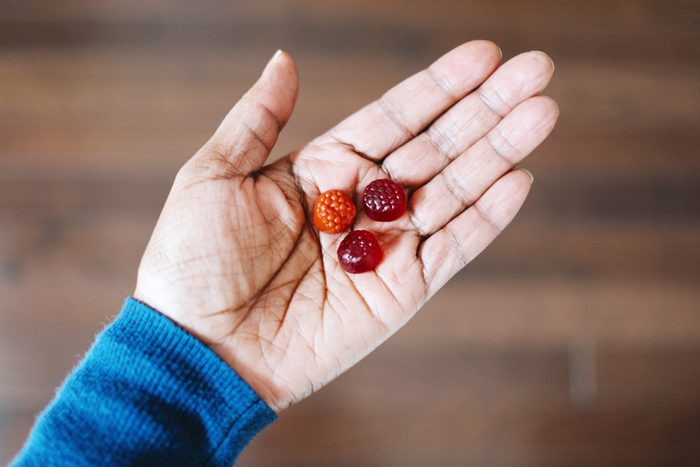
4. Melatonin
There’s quite a bit of research on the hormone melatonin to treat COVID-19. A 2022 study published in Cellular and Molecular Life Sciences found melatonin helps manage the effect of the cytokine storm that’s a common response to COVID-19. (A “cytokine storm” happens when your immune system responds aggressively to infection.) The report says melatonin can play a role in increasing cell survival, as well as lowering the level of lung damage.
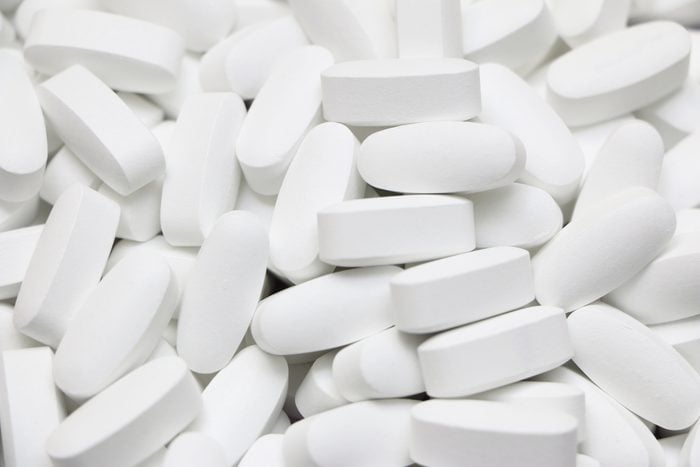
5. Probiotics
Scientists don’t seem entirely sure of the exact probiotic strains may play a role in preventing or treating COVID-19, but a 2022 study published in Elsevier – PMC COVID-19 Collection suggests they’re not discounting the role of a healthy gut in overall health.
A review of multiple studies indicates that probiotics may help with inflammation and symptoms, or reduce hospital stays. The supplements could improve respiratory symptoms through the gut-lung axis, the authors say.
“The gut microbiome has a role in immunity, so including probiotics and fermentable fibers is a good idea for any infection, including COVID,” Palmer says.

Supplements to take for COVID
“The pandemic definitely caused an uptick in dietary supplement sales, and I understand why people were doing all they could to improve their immune health,” Bandier says.
That said, research is ongoing. If you look at what supplements are being studied, and see what current guidance says about them, it may aid you in deciding if you should take these supplements.
